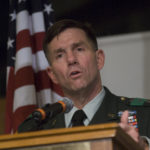Army general: Military adapting to modern wars

Lt. Gen. William Caldwell of Fort Leavenworth discusses how war has changed since the founding of the United States and how the military adapts to changes Wednesday at the Dole Institute of Politics on the Kansas University campus.
U.S. military leaders are learning to adapt to the complexities of modern wars of insurgency, an Army general said during an appearance Wednesday night in Lawrence.
Insurgent organizations such as al-Qaida know they can’t defeat the United States in a conventional war, so they resort to terrorism, said Lt. Gen. William Caldwell, commanding general at Fort Leavenworth’s Combined Arms Center, which oversees the Army’s professional military education centers throughout the country.
“Their goal is to exhaust our will to fight,” he told about 300 people who heard his speech at Kansas University’s Dole Institute of Politics. “They know they don’t have to win; they just have to survive until we go away.”
Military leaders can counter insurgent forces by knowing the cultures of the people in the countries where they fight, working with those people and communicating to them and the rest of the world their purpose. Commanders need to know how to use force and how to lend a hand, Caldwell said.
“We’re not interested in teaching our soldiers what to think but how to think,” he said. “We’re asking them to challenge assumptions and ask why.”
Caldwell, who once served as media spokesman for multinational forces in Iraq, emphasized the need for better strategic communication to the public to counter the information that insurgents put out over the Internet. Communication is one way to erode support for the enemy, he said.
“We need to make sure there is an accurate picture of events,” Caldwell said.
Moreover, Caldwell noted the importance of working with the governments and militaries in other nations.
Caldwell, who also spent two years in Afghanistan as commander of the 82nd Airborne Division, gave an insight into the military and its leadership that the public doesn’t usually get, Lawrence resident Steve Ramsdell said after Caldwell’s speech.
“We really need to let the public know who we (the military) are,” said Ramsdell, who said he grew up in a military family. His father served 22 years in the Army. “A lot of people don’t know about the military connections.”
Another Lawrence resident, Richard Dyer, said he thinks the nation’s political leaders could learn a few things from the Army, based on what he heard from Caldwell.
“I don’t know that our political leaders have the smarts to stay up with the military,” Dyer said. “They (the Army) are adapting to a changing world and I think the politicians are 50 years behind the times.”
Barbara McCandless, who drove from Topeka to hear the general, also was impressed.
“I think Kansas should be very proud we have the programs at Fort Leavenworth,” she said.
Caldwell spoke on the eve of a two-day military-social science roundtable that begins today at the Dole Institute. He also is scheduled to speak at the round table opening at 9 a.m. Today’s discussions will focus on subjects researched by teams consisting of a university professor and a military officer who has been deployed to a world trouble spot. Friday will include talks by foreign officers about their experiences with the American military.
“The more culturally agile U.S. soldiers are, the more effective they can do a job in helping to build a country like Afghanistan or Iraq to better standards,” said Felix Moos, a KU anthropology professor, who helped organize the event and who will be a participant.
The roundtable is open to the public but seating is limited.
Highlights from Lt. Gen. William Caldwell’s speech
Here are some of the highlights of Lt. Gen. William Caldwell’s speech Wednesday night at the Dole Institute of Politics.
¢ Caldwell presented a gift from Fort Leavenworth to the Dole Institute. It was a miniature statue of a 10th Cavalry trooper on his horse. The 10th Cavalry was one of four black regiments authorized in 1866 and was garrisoned at Fort Leavenworth. In 1992, retired general and former U.S. Secretary of State Colin Powell and former Kansas Sen. Bob Dole co-sponsored and raised money for the full-size statue at the fort. There were only 100 of the miniature statues made and 95 of them had been given out, Caldwell said.
“This is the 96th one,” he said as he presented it to Dole interim director Jonathan Earle.
¢ Caldwell spoke highly of private American contractors working in Iraq and Afghanistan. The jobs they do free up soldiers to handle combat duties, he said. There are 180,000 contractor employees in Iraq while there are 160,000 military personnel, he said.
“They are absolutely paramount to what we are doing. They are great patriots,” he said.
¢ The media seldom cover the peaceful activities the military does in Iraq, Caldwell said when asked by an audience member how the media coverage of the war affected the soldiers.
“They feel disappointed that the good things are not being seen,” he said. “They want the people to hear about what is going on.”
¢ China is a country the U.S. needs to stay in communication with, Caldwell said.
“It’s someone we do want to have a dialogue with so that we don’t misunderstand each other’s intentions,” he said.
¢ Caldwell admitted that the Army is “stretched and strained” to its limits with constant deployments in Iraq and Afghanistan as well as commitments elsewhere in the world. But he also commended the men and women and their families for their dedication and how well they handle the deployments.







